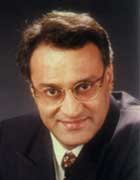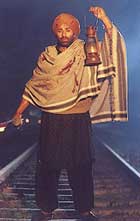Will 'Gadar --- Ek Prem Katha' create magic for Zee
By Alok Agarwal | 30 Jun 2001
Zee is desperately looking out for winners and that too, big ones. With two of its closest rivals, Star and Sony, breathing down its neck, will its maiden Hindi film — Gadar - Ek Prem Katha — provide it with the all-important break from the shackles?  At least Nittin Keni, executive producer of Gadar, is confident it will. "A film like this has not been made in India before", says Kini. Incidentally Nittin, an engineer and also an alumnus of the Indian Institute of Management, Ahmedabad, was also the first president of Zee TV and the first chief executive of Zee Cinema, the movie channel from Zee Network.
At least Nittin Keni, executive producer of Gadar, is confident it will. "A film like this has not been made in India before", says Kini. Incidentally Nittin, an engineer and also an alumnus of the Indian Institute of Management, Ahmedabad, was also the first president of Zee TV and the first chief executive of Zee Cinema, the movie channel from Zee Network.
What is a scholarly person like Nittin doing in the big bad world of films? Says Nittin, "I am a great movie buff and probably the only guy from the industry who has visited the Cannes film festival for 11 years besides attending every film festival around the world."
Gadar is important because it is Bollywood's first corporate film. It has been made by a corporate entity, Zee Telefilms Ltd, a listed entity, involving a mind boggling budget of Rs 18 crore and all payments have been made through cheque, something that rarely happens in the Hindi film industry.  "From stars to spot boys payments were made by cheque accompanied by tax deducted at source, where ever applicable", confirms Nittin. He said Gadar is the first project of its kind, which has been financed wholly by Zee Telefilms Ltd, through its own resources. "All accounts have been audited and for the first time it can be revealed officially that the film took Rs 18 crore to make", says Nittin. There was always some pressure on Zee's finances because of Gadar, disclosed Nittin, as there was no outside funding.
"From stars to spot boys payments were made by cheque accompanied by tax deducted at source, where ever applicable", confirms Nittin. He said Gadar is the first project of its kind, which has been financed wholly by Zee Telefilms Ltd, through its own resources. "All accounts have been audited and for the first time it can be revealed officially that the film took Rs 18 crore to make", says Nittin. There was always some pressure on Zee's finances because of Gadar, disclosed Nittin, as there was no outside funding.
Gadar initially, at the story narration stage, was budgeted to be made at a cost of Rs 10 crore. However by the time the movie got off the floor, the budget shot up. "This was because of the specific kind of the project. This was a period film and the requirements were huge", emphasised Mr Kini. He said the film required big crowds and expansive locales. So he went back to Zee with the revised budget, assuring them of even higher returns. Zee consented and the juggernaut moved on.
The film took about eighteen months to complete and if the initial feedback is anything to go by, the effort has been worth the trouble. Zee has already recovered its initial investment of Rs 18 crore, cost of prints totaling 400 in number at Rs 2.5 crore and publicity cost Rs 1 crore. Music rights have been sold to Zee Records for Rs 1.50 crore and film rights have been sold at an average of Rs 2.75 crore to Rs 3 crore per territory. There are 6.5 territories in all. The initial price of Rs 2.75 crore to Rs 3 crore is merely the "minimum guarantee" amount, which the distributors have provided for. Once the film gets released the "Overflows" will be shared in the ratio of 50:50 or 35:65, depending on distributor to distributor and territory to territory. The company is yet to sell cable rights, DVD rights, satellite rights, video rights and overseas rights.  Trade pundits aver overseas rights generally fetch 1 to 1.5 times the price in the domestic market. Says Nitin, "I am confident of getting Rs 100 crore from the project out of which about 75 per cent will come in the first three months of the release and balance 25 per cent after that." In fact insiders revealed that feelers for overseas rights have been in the vicinity of $10 million or approximately Rs 50 crore. If the returns turn out to be as good as envisaged, Gadar could well mean a net profit of a cool Rs 80 crore for Zee, transpiring into an additional earnings per share of Rs 2 on an equity capital of Rs 40 crore.
Trade pundits aver overseas rights generally fetch 1 to 1.5 times the price in the domestic market. Says Nitin, "I am confident of getting Rs 100 crore from the project out of which about 75 per cent will come in the first three months of the release and balance 25 per cent after that." In fact insiders revealed that feelers for overseas rights have been in the vicinity of $10 million or approximately Rs 50 crore. If the returns turn out to be as good as envisaged, Gadar could well mean a net profit of a cool Rs 80 crore for Zee, transpiring into an additional earnings per share of Rs 2 on an equity capital of Rs 40 crore.
Initial feedback
According to Tarun Adarsh of Trade Guide, a leading industry paper that tracks the performance of the Hindi film industry, the film opened to 100 per cent collections on the first two days in Mumbai and several parts of North and North-East India. These included among others states like Punjab, Maharashtra, Orissa and Assam. Company sources revealed that in some cities the film was being screened six shows a day, for the first time ever in the history of Indian cinema.
"In Punjab we are showing six shows a day beginning 6 a.m.. Other cities are Akola, Raipur and Amravati among others. In cities like Jalgaon, Dhulia and Bhilwara five shows are being screened", said the company spokesperson. He disclosed nothing was preplanned and the decision was taken on public demand. This, he said, could go on for the first three weeks. In the meantime bookings have already opened for the second week and the response reportedly has been overwhelming.
For reflections on the making of the film click here


















